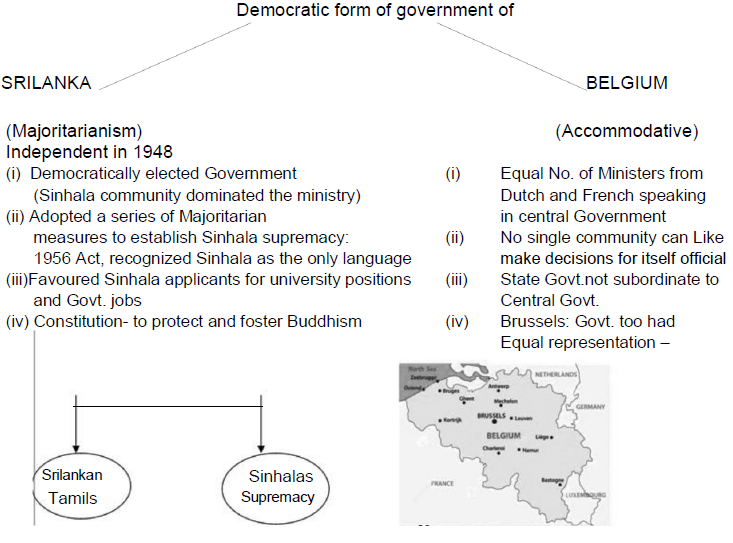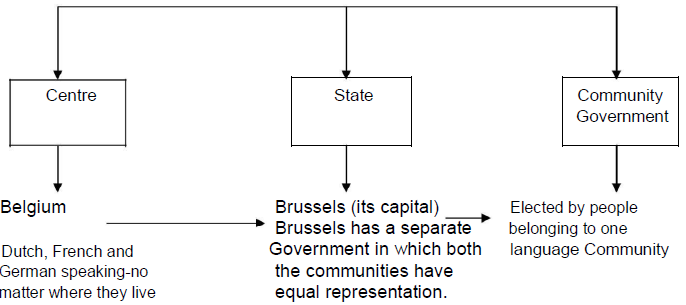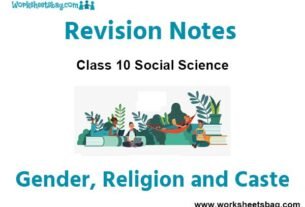Please refer to the Power Sharing Notes Class 10 Social Science given below. These revision notes have been designed as per the latest NCERT, CBSE, and KVS books issued for the current academic year. Students will be able to understand the entire chapter in your class 10th Social Science book. We have provided chapter-wise Notes for Class 10 Social Science as per the latest examination pattern.
Revision Notes Chapter 1 Power Sharing Class 10 Social Science
Students of Class 10 Social Science will be able to revise the entire chapter and also learn all important concepts based on the topic-wise notes given below. Our best teachers for Grade 10 have prepared these to help you get better marks in upcoming examinations. These revision notes cover all important topics given in this chapter.


| Sri Lanka Result:- | Belgium Result- |
| a) Increased the feeling of distrust Among the Srilankan Tamils, Civil War Started | a) Country united respecting the feelings of different communities and regions |
| b) Constitution and the government ignored their Interests-denied equal political rights | b) Brussels chosen as headquarters of European Union |
| c) Sri Lankan Tamils launched parties and demand Tamil Ealam State, Tamil as an official language, regional autonomy, equality in securing education and jobs | c) Country United |
Civil war causes
- Fought for recognition of Tamil as an official language.
- Wanted regional autonomy
- Equal opportunity in securing education and jobs 1980-demanded an independent Tamil Eelam in northern and eastern part of Srilanka
BELGIUM
Accommodation – Three kind of Government

Balance of Power with checks and balances



SHORT ANSWERS QUESTIONS
Question. How has the democratically elected government in Srilanka established Majoritarian, measures?
Ans.
- In 1956, an Act was passed to recognize Sinhala as the only official language,disregarding Tamil.
- The government followed preferential policies that favoured Sinhala applicants for University positions and government jobs.
- Protected and fostered Buddhism.
Question. Mention the three causes for the Civil War in Sri Lanka?
Ans. The distrust between the two communities, Sinhala and Tamil turned into conflict. The Srilankan Tamils had launched Parties and struggles-
- Their demand for more autonomy to provinces populated by the Tamils was denied.
- Struggles for the recognition of Tamil as an official language, for regional autonomy and equality of opportunity in securing education and jobs failed.
- In 1980s several political organizations were formed demanding an independent Tamil Eelam [state] in northern and eastern part of Srilanka. It soon turned into a Civil War.
Question. How is the system of,checks and balances” maintained among the different organs of the government?
Ans.
- Power is shared among the different organs of the government such as the Legislature, executive and judiciary.
- It allows different organs of the government placed at the same level to exercise different powers.
- Such a separation ensures that none of the organs can exercise unlimited power. Each organ checks the other .This result in balance of power.
Question. List the three merits of Power Sharing?
Ans.
- Power sharing is a good way to ensure the stability of political order. It is the very spirit of democracy.
- It brings in the unity of the nation.
- How has the democratically elected government in Srilanka established
Question. Why has Brussels ,been chosen as the headquarters of the European Union?
Ans.
- They recognized the existence of regional differences and cultural diversities and the arrangement [Accommodation] they worked out is different from any other country and is innovative.
- It has avoided Civic problems and division on linguistic basis, instead brought stability.
- Though complicated, this arrangement has enabled everyone to live together within the same country.
LONG ANSWERS QUESTIONS
Question. Explain the four forms of Power Sharing with examples.
Ans.
- Horizontal distribution of power.[between the organs of the government-Legislature, Executive and Judiciary] – India
- Vertical distribution of power. [among Central level, state level and local level] – India
- Power sharing among different social groups.[ Community Government, [Belgium] reserved seats, Wcrnen ] – India
- Power sharing among different political parties, Pressure groups and Movements. – In India [Coalition government]
Question. how has the Belgian government solved its ethnic Problem?
Ans. The Path of accommodation adopted in Belgium-
- Dutch and French speaking ministers shall be equal in the central govt.
- Many Powers of the central government have been given to state govt. The state Govt is not subordinate to the Central Govt.
- Brussels has a separate Govt. in which both the communities have equal representation.
- There is a third kind of Govt. called community Govt. elected by the people belonging to Dutch, French and German no matter where they live.
- When many countries of Europe came together to form the Europe union, Brussels was chosen as its headquarters.


